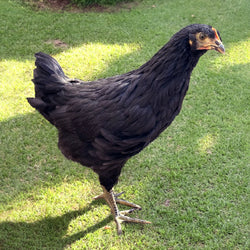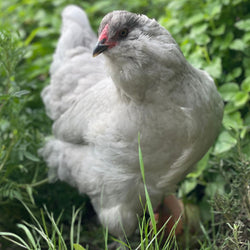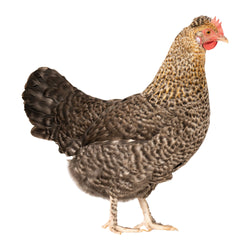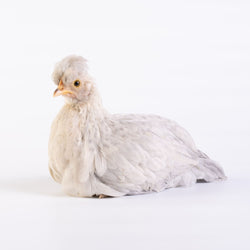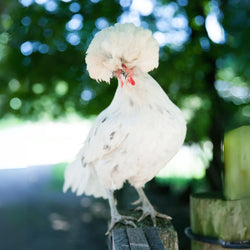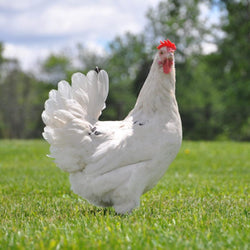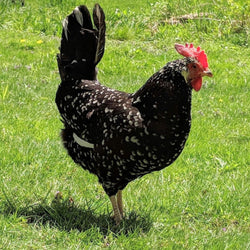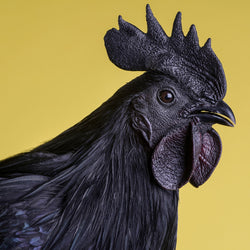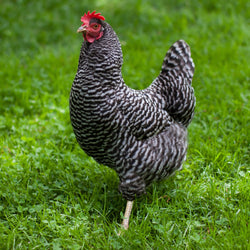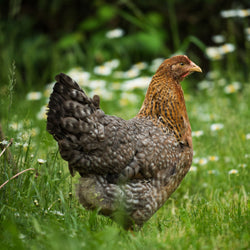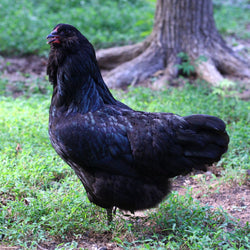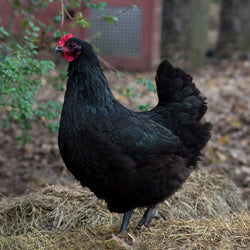f=menu&page=3/--
Frequently Asked Questions
Here we answer the most commonly-asked questions about ordering, chicken care, and more.
My hen laid a teeny tiny egg, and when I cracked it open, there was no yolk! Should I be concerned?
Awww, isn't that cute! Tiny, yolkless eggs are sometimes known as witch eggs or fairy eggs. Cute, huh? Occasionally a hen will lay a fairy egg when something has disturbed her reproductive cycle. Sometimes a hen will lay a fairy egg or two just as she comes into laying, before her reproductive system has gotten into gear. They do come in all the colors that hens lay: white, brown, green, blue and so on, although they are sometimes lighter or darker than her regular eggs because they may spend more or less time in the "egg painting" area of her...
Read MoreWhich bantam breeds should I choose if I want them for eggs?
Bantam eggs in general are quite small by comparison to what you see in the grocery store. That makes sense! Smaller birds lay smaller eggs. Below you see two cochins, one a bantam and the other a regular-sized large fowl cochin. Of course the bantam cochins will lay smaller eggs. (They have smaller chicks, too!) Regardless, bantam chicken eggs taste the same as the eggs of larger chickens, and certainly if your birds have access to pasture, bantam or large fowl, the eggs will taste MUCH better than what you can get in a grocery store. However, some bantams lay...
Read MoreHow do I cook with bantam eggs?
The eggs of bantam chickens are smaller than the eggs we're used to seeing in the grocery store. Just how small? Of course, it really depends on the hen. For instance, the eggs of Sebright bantams and Belgian bantams, are SUPER tiny, but the eggs of Silkie bantams are simply small. So all bantam eggs are not equivalent, the same way some large fowl breeds lay jumbo eggs, while others lay medium eggs. Here are the size classifications for eggs: 1 jumbo egg - 2.50 ounces 1 extra-large egg - 2.25 ounces 1 large egg - 2 ounces 1 medium...
Read MoreWhy do I need to store my eggs large end up?
Storing your eggs large end up will keep them freshest. This is because the air cell in an egg is located at the large end, so less moisture will evaporate out of the egg if it is set with the air cell up in the carton. The pointy end, with egg white closer to the porous surface of the shell, is less exposed to air when it is pointing DOWN in the carton. Frankly, though, if you are storing eggs for eating, it probably won't make much difference unless you are storing them for very long periods of time (and...
Read MoreShould I be concerned about lead in the environment when I keep chickens?
It's not a common problem, but it is an area of concern. Common sense will tell you not to keep your chickens around peeling or flaking paint, lead based or not. But while you can probably identify if you have paint chips falling into an area your chickens frequent, you may not be aware of any contamination that is not visual--- and that's the danger. For example, if you live in an area of old homes that may have used (once common) lead-based paint on siding, trim, barns or other outbuildings, the lead from old paint chips may have turned...
Read MoreWhy are the yolks of my chickens' eggs settling to one side?
Of course, we can't know for sure what may be going on, but we can offer some information that may assist you in figuring it out! First of all, it's important to understand what it is that causes egg yolks to stay centered in the first place. The chalazae are the parts of the egg that are sort of like springs, and they act to hold the yolk in place. The chalazae are the think whitish parts you will have seen on either side of the yolk. Sometimes people will choose to remove this part of the egg when cooking,...
Read MoreI got a terrible hatch. Does that mean most of my eggs were infertile?
No, a terrible hatch doesn't mean that most or even any of your eggs were infertile! They may all have been fertile. Remember, just because an egg doesn't hatch (or even if it doesn't develop), that doesn't mean it wasn't fertile. It is not possible to see the fertilized blastodisc, or blastoderm, on the yolk of the egg after 21 days of incubation, as it will have deteriorated by then. �If you have a rooster with your hens, you can presume good fertility up to about a ratio of ten or twelve hens to every rooster. To check your exact...
Read MoreShould I be concerned that my hen laid an egg with blood on the shell?
When a hen has just begin laying, there can occasionally be a little blood on the egg shell, but it is usually no cause for concern. Eventually her vent gets used to stretching when she lays, and becomes very elastic. However, at first it does occasionally happen that with a large egg she might bleed just a little. And it can happen, too, to an older hen if she lays an egg larger than she is used to. If there is a lot of blood, if there is blood every single day, or if you see blood on your hen's...
Read More







"The Clubhouse" Coop
Easy to assemble and built to last, the Clubhouse Coop is the perfect starter coop for a small flock.
